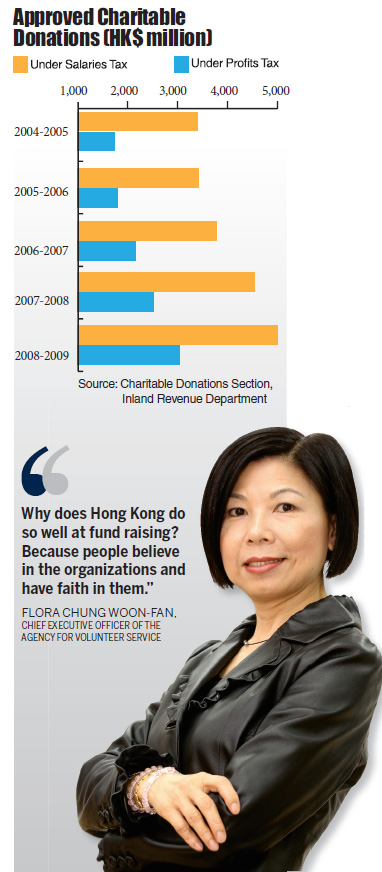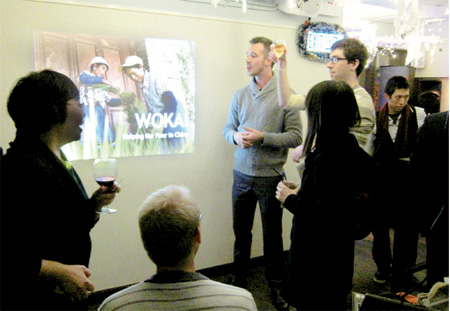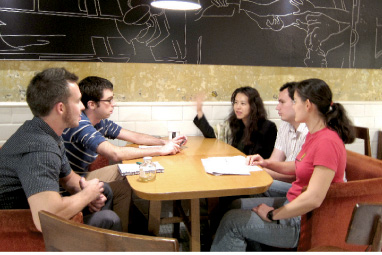A community of giving
Updated: 2010-12-30 06:49
By Guo Jiaxue(HK Edition)
|
|||||||||
|
Michael Morrill was giving a presentation about how his charity organization will help people in rural China. Guo Jiaxue / China Daily |
|
Volunteers of Wokai, a US non-profit organization, were planning a fund-raising event. Guo Jiaxue / China Daily |

Hong Kong is well known for its fixation on business and earning. What is not so well known is that people in Hong Kong are among the most generous in the world when it comes to helping others. Guo Jiaxue reports.
It was one of those rare nights when Hong Kong gets cold. The temperature was still dropping. Two nights later Hong Kong would suffer its coldest night in 11 years. The Hong Kong Observatory had warned of the cold snap days earlier but the unexpected rain that came with it only made things worse.
The bad weather also cast a pall over the spirits of 32-year-old Michael Morrill, who had worked for over a month with friends, planning a charity event that night.
Looking outside at the bleak night, he thought chances were pretty good nobody would come.
Morrill, an American came to the city more than two years ago. It was his first trip to China. He spends most of his spare time volunteering for the US non-profit organization, Wokai, which became active in Hong Kong in November 2009. The organization's mission is to provide small loans for poor people living in rural China, to help them start small businesses.
When Morrill finally got to the charity event that night, a pleasant surprise awaited. The turnout was pretty good.
"Not as good as expected due to the nasty weather," he said after the event. "But we sold 15 gift cards in all, and are now the top-selling chapter worldwide."
Wokai, registered in the US has been raising fund in five US cities and two Canadian cities. "We also have chapters in Beijing and Shanghai, but as a foreign NGO we are not allowed to raise funds in China," Morrill added. But among all these cities, Hong Kong is naturally the best place to do so.
"If we do this in the United States they say: why we should help? The country is already very rich and the government has enough money to take care of themselves. But," Morrill paused, "if we talk to somebody who lives in Hong Kong who has family living on the mainland, they are more likely to donate to us than any other places in the world."
It's not just those who come from the mainland or have mainland background or who have lived there, many Hong Kong residents simply feel connected to the mainland.
"Like myself," said another volunteer Lane Rettig. The financial industry professional from New York moved to Hong Kong two years ago. Before coming he studied Chinese in Shanghai for a few months. Now the talented young man already can speak fair Mandarin and Cantonese.
"Hong Kong is part of China and people here tend to have a very strong connection with China," added the 27-year-old.
The financial character of the city is also an advantage in terms of this kind of charity since the group's mission is funding and providing loans.
"Most of our volunteers are also from financial companies," Rettig said. "I work for a financial company and I was looking for something meaningful that we can give back for charity. It's connected to what I do anyway," he recalled. That's what got him into Wokai.
The robust volunteer culture in Hong Kong really surprised the group of young Westerners.
Rettig, with a few years' volunteer experience in New York, was delighted to find that people in this infamously busy city are also willing to volunteer.
"Coming from another place, I'm surprised how active people here are. There're a lot, a lot of charities in Hong Kong," he said. "Young people very busy with their work and personal lives still find time to come to every event we have. I'm surprised how many people come -it's always more than expected, more than in New York. It's easier to get people involved."
The supportive SAR government also plays an important role in helping the city to maintain its "warm hearted" reputation.
"When we hold big outdoor events with hundreds of people or something and we have to get the police involved, they've been very supportive, never given us any problems," he said. "That would be harder in New York, let's be honest."
These young people, Morrill, Rettig, and eight others, have already recruited nearly 300 volunteers, and raised $15,000 directly, according to incomplete records, in the year since the launch.
Flora Chung Woon-fan, Chief Executive Officer of the Agency for Volunteer Service, commented on the strong ethic for volunteering and donating among the people of Hong Kong. "Especially personal donations, (Hong Kong) tops in the world," she told China Daily.
That's quite different from other places with strong donation cultures like the US, where most of the donations actually come from corporations, she added.
According to statistics provided by the Inland Revenue Department, Approved Charitable Donations under Salaries Tax for the year 2008-2009 reached HK$4.99 billion, while Donations under Profits Tax were HK$3 billion. Even though the corporate donations are catching up fast, the personal donations are still significantly higher.
Chung believes excellent management of non-government organizations in Hong Kong deserves some of the credit for the high donations.
"Why does Hong Kong do so well at fund raising? Because people believe in the organizations and have faith in them," she said, noting that transparency and accountability to the public is heavily emphasized in Hong Kong. "They seldom donate their money directly to the mainland; Hong Kong people don't have enough confidence in organizations on the mainland."
In addition to donations, many also devote their time to volunteering. A 2009 survey indicated that about 1 million people in Hong Kong have taken part in volunteer efforts. "Around 24,000 went north to volunteer on the mainland," Chung said.
The tragic deaths of two Hong Kong volunteer workers this year underscored the commitment of people in the busy financial city to helping others. . Wong Fuk-wing, 46, died while trying to save children who had become trapped after their school collapsed in April's earthquake in Yushu, Qinghai province. Eight months later, another Hong Kong volunteer, 35-year-old Tsang Man-kit died in a traffic mishap while delivering household items to local primary schools in earthquake-ravaged Yushu.
Hong Kong Council of Social Service, an umbrella organization of 370 non-government organizations, said 28 of its members are now providing services for the needy on the mainland. More organizations are starting to extend services to the mainland, though they are not yet included in the tally, Membership Manager Cheung Siu-cheung told China Daily.
"After all, blood is thicker than water," Chung said.
(HK Edition 12/30/2010 page4)

